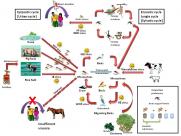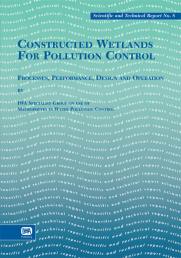 The Zika virus: we should expect more like it!
The Zika virus: we should expect more like it!
Robert Armon, author of the comprehensive book: Environmental Aspects of Zoonotic Diseases (2012), sheds light on the global problem of flaviviruses such as Zika. He notes that this recently publicised disease is just one example of many severe viruses that could flourish in the right environmental conditions.
Flood Control and Disaster Management
Flood control refers to all methods used to reduce or prevent the detrimental effects of flood waters (wikipedia). Some of the common techniques used for flood control are installation of rock berms, rock rip-raps, sandbags, maintaining normal slopes with vegetation or application of soil cements on steeper slopes and construction or expansion of drainage channels. Other methods include levees, dikes, dams, retention or detention basins. After the Katrina Disaster that happened in 2005, some areas prefer not to have levees as flood controls. Communities preferred improvement of drainage structures with detention basins near the sites.
Disaster Management
Disaster management plans are multi-layered and are aimed to address such issues as floods, hurricanes, fires, bombings, and even mass failures of utilities or the rapid spread of disease. The disaster plan is likely to address such as important matters as relinquishing people from an impacted region, arranging temporary housing, food, and medical care.
Rainwater - Why is it Safe?
There are so many misconceptions in the world – and rainwater is no exception. When people think of rainwater, they often think of wastewater, pollutants and even balding! Do you think these ideas are accurate? Whilst such concerns might stem from a common misunderstanding, we seem to accept them as scientific fact. In this chapter, the truth will be exposed: rainwater is actually extremely clean and safe.
Sustainability in Water Supply
This article serves as a general reference for sustainable water supply systems. The scope remains global and macroscopic, though there may be regional differences depending on the water sources available in a particular setting. What is considered “sustainable” in one location may be a challenge to sustainability elsewhere.
Water and Wastewater Management Projects in the Tropics
Over the last 30 years a significant number of water and sanitation projects have been implemented in developing countries and billions of dollars has been spendt. Projects have covered rural as well as urban water supply systems, wastewater collection, disposal and treatment systems, and have mainly been financed by international funding agencies such as international banks and international aid organisations. However, unfortunately it is a fact that the number of failures, or non-functioning, of the established systems, outnumbers the number of successes.
Bio-toilets: Sustainable Solution to India’s Sanitation Challenge
Banka BioLoo Pvt Ltd, a firm committed to environmental betterment and social uplift, is supporting to eradicate the malaise of open defecation in India. By providing eco-friendly bio-toilets (or bioloos), the enterprise is helping meet the Millennium Development Goals (MDG-7) and actively supporting the government’s vision of an open defecation free society.
Integrated Water Resources Management: Basic Concepts
IWRM is based on the three principles: social equity, economic efficiency and environmental sustainability. Considering these principles means answering the following questions:
- How will my decision/ action affect access for other users to water or the benefits from its use?
- Will my decision/ action result in the ‘most efficient use of the available financial & water resources?
- How will my decision/ action affect the functioning of natural systems?
 "More Crop Per Drop": Revisiting a Research Paradigm
"More Crop Per Drop": Revisiting a Research Paradigm
ISBN: 9781843391128
eISBN: 9781780402284
This volume is an analytical summary and a critical synthesis of research at the International Water Management Institute over the past decade under its evolving research paradigm known popularly as 'more crop per drop'. The research synthesized here covers the full range of issues falling in the larger canvas of water-food-health-environment interface. Besides its immediate role in sharing knowledge with the research, donor, and policy communities, this volume also has a larger purpose of promoting a new way of looking at the water issues within the broader development context of food, livelihood, health and environmental challenges.
More crop per drop: Revisiting a research paradigm contrasts the acquired wisdom and fresh thinking on some of the most challenging water issues of our times. It describes new tools, approaches, and methodologies and also illustrates them with practical application both from a global perspective and within the local and regional contexts of Asia and Africa. Since this volume brings together all major research works of IWMI, including an almost exhaustive list of citations, in one single set of pages, it is very valuable not only as a reference material for researchers and students but also as a policy tool for decision-makers and development agencies.
 Constructed Wetlands for Pollution Control
Constructed Wetlands for Pollution Control
ISBN: 9781900222051
Scientific and Technical Report No.8
The book presents a comprehensive up-to-date survey of wetland design techniques and operational experience from treatment wetlands. This book is the first and only global synthesis of information related to constructed treatment wetlands. Types of constructed wetlands, major design parameters, role of vegetation, hydraulic patterns, loadings, treatment efficiency, construction, operation and maintenance costs are discussed in depth. History of the use of constructed wetlands and case studies from various parts of the world are included as well. Constructed Wetlands for Pollution Control will be indispensable for wastewater treatment researchers and designers, decision makers in public authorities, wetland engineers, environmentalists and landscape ecologists.